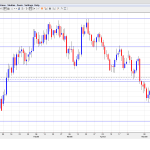U.S. stock index futures turn negative in an illiquid, volatile session as investor sentiment has yet to stabilize amid doubts whether the U.S. equity selloff is over as yields remain just south of the critical 2.85% level. S&P E-mini contracts slid 0.1%, while the VIX is up 1% to 28.1 after 2 days of declines. Including fair value, the Dow is expected to have an implied open of over 200 points lower while the S&P will open around 2,665.

Meanwhile, in this post-VIX ETP world, liquidity remains non-existent, as this chart from nanex shows.

It’s not just the US however which can’t find its footin, as all risk-related assets trade under pressure in a generally muted session following yesterday’s whipsawed session which saw stocks spend much of the day in the green, only to slide at the close.
European equity losses hit ~1.0% as the mining sector underperforms while banks are supported by decent earnings reports from Commerzbank, SocGen, and UniCredit. In terms of sector specifics, the financial sector is the outperformer with earnings from the likes of Commerzbank (+2.4%), SocGen (+4.1%), UniCredit (+2.6%) and Zurich Insurance (+3.8%) lifting the sector with Swiss Re (+3.8%) also lending a helping hand near the top of the SMI after news that Softbank could acquire a stake in the Co. Elsewhere, GSK (+2.3%) has been supported by news that Novartis’ launch of their Advair copy will be delayed. In terms of bourses, the CAC (-0.3%) has seen some modest outperformance, with domestic earnings from Total (+1.8%), Pernod Ricard (+2.2%) and Publicis (+3.8%) capping losses.
Earlier, shares in Japan closed higher after a turbulent session while China’s stocks fell for a third day, even as Hong Kong equities climbed. Australia’s ASX 200 (+0.2%) was lower for most of the day as weakness in the commodity complex weighed on mining names, however, the index then gradually pared losses as strong Chinese Imports provided some encouragement. The Nikkei 225 (+1.1%) outperformed with corporate earnings back in the limelight, while Hang Seng (+0.4%) and Shanghai Comp. (-1.4%) ignored strong trade data and were indecisive after the PBoC skipped open market operations for the 11th consecutive occasion, and with heavy losses seen across the big 4 banks in the mainland.
The biggest highlight of the overnight session, however, was the yuan which, as we reported overnight, fell the most since the currency’s devaluation in August 2015 after China reported a much narrower-than-expected trade surplus as imports jumped. According to Reuters, China has resumed its Qualified Domestic Limited Partnership plan after a two-year halt, granting licenses to about a dozen global money managers that can raise funds in China for overseas investments. Increasing imports and investment overseas both contribute to a weaker currency, and the result was a sharp plunge in the Yuan, a move which may again be criticized by Trump as indicative of currency wars.

“Selling of offshore yuan has spurred short covering of the dollar,” said Ko Haruki, head of the financial solutions group at CIBC World Markets (Japan) in Tokyo. “The dollar’s gain against the yuan is lifting dollar-yen, which had also seen short covering as the Nikkei 225 stayed in positive territory.”
In other words, in today’s interlinked market, the plunge in the Yuan, ended up boosting Japanese stocks by way of a dollar, that traded higher much of the overnight session.
Meanwhile, the all-important catalyst for the recent equity selloff, U.S. 10-year Treasuries, were steady after Senate leaders unveiled a bipartisan deficit busting deal while weak demand at Wednesday’s 10Y auction pushed the yield back toward the recent four-year high.

At the same time, the pound drifted higher before a Bank of England rate decision, and the euro weakened as ECB member Jens Weidmann said the central bank will monitor the impact of the currency on inflation. USD continues to find support across G-10, with ZAR and TRY particularly weak; yuan in focus after overnight selloff, which was driven by narrower trade surplus and increased outbound investment reports.
A summary of key macro moves, courtesy of Bloomberg:
In commodities, WTI and Brent crude futures have seen relatively sideways trade overnight and this morning as prices remain in close proximity to yesterday’s lows seen in the wake of the ramp up in US production shown via the DOE’s with output above 10mln bpd and perhaps more crucially, above that of Saudi Arabia. Elsewhere, latest reports confirm that the Forties pipeline has now resumed operations. In metals markets, spot gold is trading lower as the yellow metal succumbs to the firmer USD, while copper’s attempt to nurse losses during Asia-Pac trade was restricted by the risk-averse tone in its largest consumer China.
Bulletin Headline Summary from Ransquawk
Market Snapshot
Top Overnight News from BBG
Fed’s Kaplan: 3 hikes this year is appropriate; best way to continue expansion is to remove accommodation
Reuters: China revives QDLP outbound investment scheme; licenses granted for some funds to raise money in China for investment overseas ending a 2-year halt, according to people familiar
Japanese investors dumped U.S. sovereign bonds for a third month in December, taking sales last year to the highest in a decade. Total withdrawals for 2017 were 3.83 trillion yen, the most since 2007, when they offloaded 3.98 trillion yen. They were net buyers between 2014 and 2016.














Leave A Comment